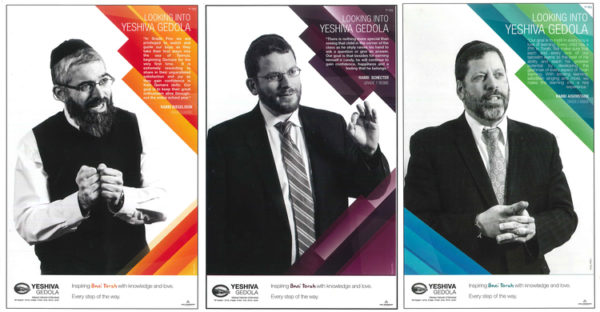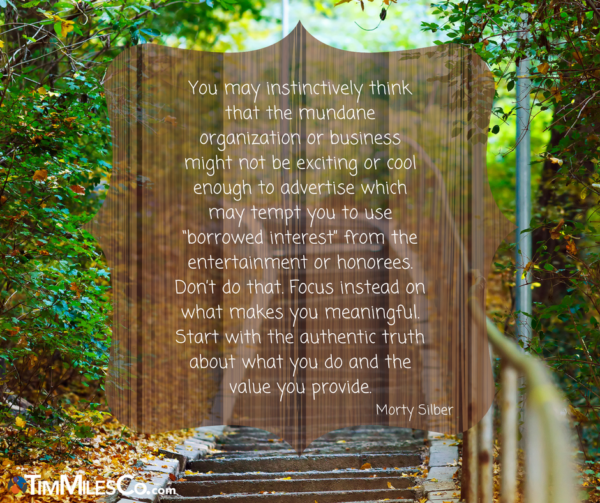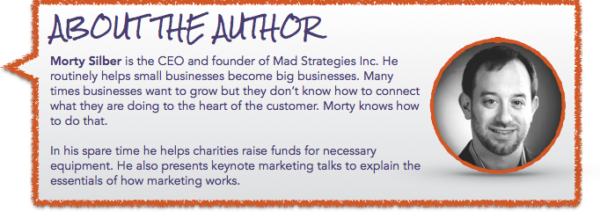(Today’s guest essayist Morty Silber is a friend, colleague, and a man I respect quite a lot. He started his own company when he was 26 and in less than 5 years grew his business to 2600 customers. Today he is the CEO of MAD STRATEGIES, Inc. and a Wizard of Ads partner. He has helped a lot of really cool businesses do some really cool things and today he shares one of his favorite examples with us.)
The Yeshiva Gedola of Montreal held annual fundraising dinners often but not every year. The reason they weren’t more consistent about it was because the dinners were only mildly successful financially. About five years ago, the President of the Yeshiva, Rabbi Dovid Rothchild, asked me to get involved in upgrading their dinner efforts.
Besides upgrading the event itself to an operationally successful and enjoyable experience, we focused on the messaging for both the advertising and the evening itself. Many organizations expect me to advertise the event, to promote the entertainment for the event or come up with some catchy tagline. Fortunately for the Yeshiva Gedola of Montreal, that’s not what we did, because what we did worked. Perfectly.
Our ads promoted the school and the school’s mission, rather than the event.
Our ads focused on what was authentic and true about the Yeshiva rather than trying to use “borrowed interest” from event entertainment or some gimmicky tagline.
Our ads formed a human connection between the people at the school and the reader.
One year we highlighted Rabbis from Kindergarten through Grade 11: each week focusing on a different rabbi. We captured modern black and white pictures of each and every rabbi. Next to each picture we had the rabbi write one paragraph to explain what’s special about his class.
Of course, the skeptical person might look at these pictures and think: well that’s all well and good for long-term branding, but how is that going to help the fundraising effort?
Answer: the more people identify with and wish to support the organization’s mission, the more readily they’ll open their wallets to show their support.
In the first year, we ran ads that focused on the Yeshiva’s message, we raised 10x more money than the previous year. The ads were a smashing success, to the point where the elementary boys were cutting them out of the local magazines and hanging them on their walls and making photo albums from them.
A quote attributed to advertising great, Lee Clow – who created Apple’s 1984 and Think Different ads, and who knows a thing or two about creating beloved ads that become posters and art in their own right – says, “Any ad can have a call to action. A great ad is its own call to arms.”* I agree, and think that’s the real difference between these ads and the typical charity event ad. Typically, charity event ads have an over hyped call to action around buying tickets but these ads had a call to arms that rallied the community around the mission and identity of the school.
Now you may be wondering how all this applies to you. Here’s how: stop wasting money on boring ads that have pictures of all the honorees but have no emotional impact. Stop advertising the entertainment then neglect to tell readers why your organization is one valuable enough to deserve their money. You may instinctively think that the mundane organization or business might not be exciting or cool enough to advertise which may tempt you to use “borrowed interest” from the entertainment or honorees. Don’t do that. Focus instead on what makes you meaningful. Start with the authentic truth about what you do and the value you provide.
And finally, try finding that human connection rather than forcing a false sense of urgency.
It may be easy when spending money on an ad to want to see results right away, and therefore shout at customers that they must “act now”, but I promise you’ll find that a timeless and authentic call to arms will work better over the long term than an over hyped and time limited call to action.
*Though the quote is commonly attributed to Lee Clow, it really came from the Twitter account @leeclowsbeard (which is heartily endorsed by the real Lee Clow) rather than Lee Clow himself.
(Thank you, Morty, for stopping by and sharing your knowledge with all of us. It seems pretty clear you know your stuff. If you’re interested in submitting a guest essay, we’d love to hear from you. We’re looking for stories about management, marketing, or motivation that would be helpful to people who own or work for family businesses or nonprofit organizations. Contact us with your submission today!)



